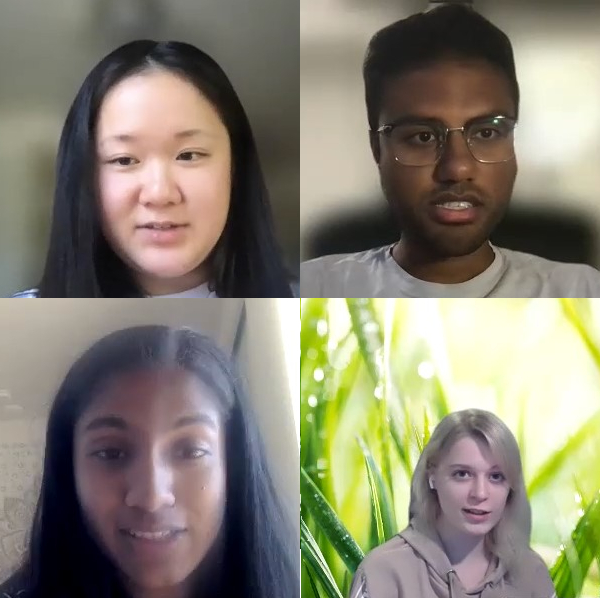Earlier this month, the Harker Research Club hosted a panel with Vikas Bhetanabhotla ‘14, Cynthia Chen ‘20, Anastasiya Grebin ‘18 and Ruhi Sayana ‘19, who spoke about their post-high school careers and offered advice on how to find research opportunities.
The panelists each shared what they had done after graduating from Harker and how the research they conducted as Harker students helped shape their current work. At Harker, Sayana, who currently works in a lab at Stanford University studying neurodegenerative diseases, had a significant interest in pediatric oncology before becoming interested in genetics. “When I was applying to labs at Stanford, I was trying to look at something at the intersection of pediatric disease and genetics, and that’s how I ended up at the lab that I am now,” she said. “So [my work at Harker] definitely informed it.”
Bhetanabhotla, who graduated from the University of California, Berkeley in 2018 and now works at Palo Alto Networks, was heavily interested in machine learning. “My research was the intersection of cosmology with machine learning, so that research experience with machine learning really guided my interests through college,” he said. This carried through to his post-college career, as machine learning is now a part of his work at Palo Alto Networks
“In high school pretty much all of my research was wet lab, and I jumped around a lot,” said Grebin. “I did some plant science. I did some data set analysis for cancer mutations.” As a sophomore, she participated in a directed evolution project that “didn’t pan out,” but she now attends CalTech, “which is the place where directed evolution was essentially invented,” and her work now incorporates directed evolution to create viral constructs.
Most of Chen’s projects at Harker were in bioinformatics, which incorporated biology and computer science. Her work in that area earned her a spot as a finalist in the 2020 Regeneron Science Talent Search. She is now attending Harvard University and works in a lab at MIT, doing research to learn how to better explain how artificial intelligence models work. “I think the projects [I worked on at Harker] gave me a good starting point for figuring out what I wanted to explore further in college,” she said.
The panelists also offered advice on how to find research opportunities in high school. “It’s all about casting a wide net,” Bhetanabhotla said. “I knew I was interested in the astronomy area a little bit but I was also interested in biology potentially so I just emailed a lot of different professors.”
Sayana agreed. “You’re in high school,” she said. “This is the time to explore as much as you can, and if you’re reaching out to labs there’s a very high chance that a lot of people won’t respond to you, so the wider out you go, the better chance you’re going to have at getting a response.”
Chen recommended the approach of emailing research labs that seemed potentially interesting or open to taking on high school students, “because I didn’t really know specifically what I wanted to do in terms of research in high school because you’re exposed to so many different subjects.”
Grebin did much of her research in high school at Harker after school. “I kind of advocate for that path for at least the first couple of years before you decide to move on to working in a lab and doing slightly more in-depth research,” she said. “Simply because you have so much more ability to pick what you want to do. I miss being able to pick the project that I want to work on as an undergraduate.”
